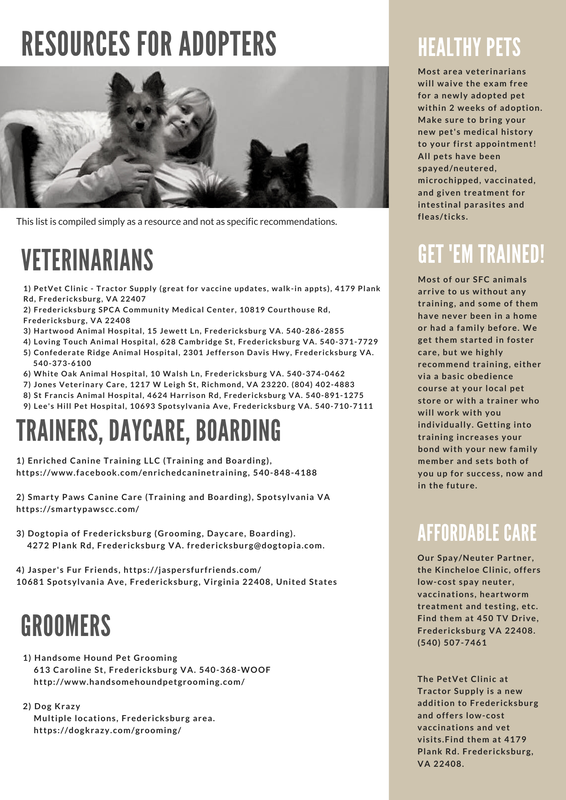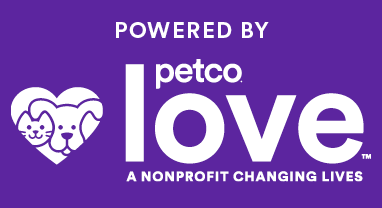Adoptable Animals FAQ
Where do your animals come from?
The vast majority of the pets we intake come from rural shelters throughout Virginia that lack the resources or adopters to support their population of homeless pets. Most of our shelter partners work very hard to get dogs and cats out of the shelter and to rescues in our region who are better equipped to find new homes, and we are proud to work with them.
What's the breed?
Short answer: it's all a guess. There are very few instances of a dog or cat entering the shelter system with papers or a DNA test on file, and when we get puppies, we frequently never see the parents. We are constantly amazed at the DNA results shared by our adopters. If we have a general guess at breed mix, we will list that on the pet's profile along with a secondary classification of "mixed breed." We do not guarantee the breed or adult size of any animal that comes to us.
Can I adopt a pet without it being spayed/neutered?
No. All pets adopted from SFC are spayed/neutered prior to the time of adoption.
The vast majority of the pets we intake come from rural shelters throughout Virginia that lack the resources or adopters to support their population of homeless pets. Most of our shelter partners work very hard to get dogs and cats out of the shelter and to rescues in our region who are better equipped to find new homes, and we are proud to work with them.
What's the breed?
Short answer: it's all a guess. There are very few instances of a dog or cat entering the shelter system with papers or a DNA test on file, and when we get puppies, we frequently never see the parents. We are constantly amazed at the DNA results shared by our adopters. If we have a general guess at breed mix, we will list that on the pet's profile along with a secondary classification of "mixed breed." We do not guarantee the breed or adult size of any animal that comes to us.
Can I adopt a pet without it being spayed/neutered?
No. All pets adopted from SFC are spayed/neutered prior to the time of adoption.
New Pet Health FAQ
When do I need to take my new pet to the veterinarian?
Establishing a relationship with a veterinarian is important for the long-term health and well-being of your animal. Some veterinary clinics offer reduced rates or complimentary exams for new adoptions, and we always recommend seeing a vet within 14 days of adoption to continue important vaccination and treatment series such as ongoing deworming, flea and tick preventative, and heartworm preventative. See our partial list of local veterinarians in the sections above.
What if my new pet becomes sick?
We know how stressful it can be when your pet is sick. SFC does everything we can to ensure adoptable animals are healthy before leaving our care.
While our team makes every effort to assess and accurately report the health of your new pet, specific symptoms can be especially difficult to detect or don’t present at all while an animal is in our care. In some cases, your new animal may show signs of illness shortly after adoption or may be in an incubation phase of a disease and may not show signs of illness until after going home. Infectious diseases seen in shelter animals range from common treatable conditions such as kennel cough in dogs and URI in cats, to less common but potentially life-threatening diseases such as distemper, canine parvovirus, canine influenza and the feline leukemia virus. Common symptoms of illness include sneezing, coughing, lethargy, lack of appetite or diarrhea. Some diseases are considered to be potentially transmissible to humans, such as giardia, salmonella or ringworm. While SFC can work with you to troubleshoot immediate concerns (within 7 days of adoption) and in some cases can return pets to our care for treatment, we cannot reimburse you for any veterinary expenses you may incur post-adoption. If you agree to diagnostics or treatment recommended by your veterinarian, or you obtain medications from your veterinarian, it will be at your own expense. Contact us first at [email protected] if you have questions related to your pet’s medical history or symptoms that appear within a week of adoption.
Are my pets at home at risk for getting sick?
It is a good idea for all pets at home be up-to-date on vaccinations two weeks prior to bringing home a new animal. We recommend that resident cats be up-to-date on Rabies and FVRCP, and resident dogs be up-to-date on Rabies, DHPP and Bordetella. SFC Virginia does not provide treatment for other animals in your home should they become ill.
Lost Pet Resources
I lost my pet! How can you help?
1. Search for your lost dog or cat on Petco Love Lost: We have partnered with Petco Love Lost to easily help search the national lost and found database and create a searchable/shareable alert for your missing pet. Upload a a picture of your pet. Powered by facial recognition technology, Petco Love Lost helps match found animals to reported lost pets nationwide. Visit Petco Love Lost and search now! 2. Use the sharing features on Petco Love Lost to distribute your lost pet listing on other social media outlets like Facebook, Craigslist, and Nextdoor. 3. Make sure your pet’s microchip information is updated: If a finder takes your missing pet to be scanned for a microchip, you want to make sure that all the information is correct so that you will be contacted immediately. 4. Check with your local animal services, animal control, and animal shelters: Call to see if your missing pet is at one of these locations. An in-person trip is preferable so you can look and see if your pet is in their care. Many organizations allow you to place a lost report with them, where you can leave a photo of your pet and your contact information. 5. Local to the Fredericksburg area? Talk to our local trappers at Return 2 Home Lost Pet Resources for help. |





